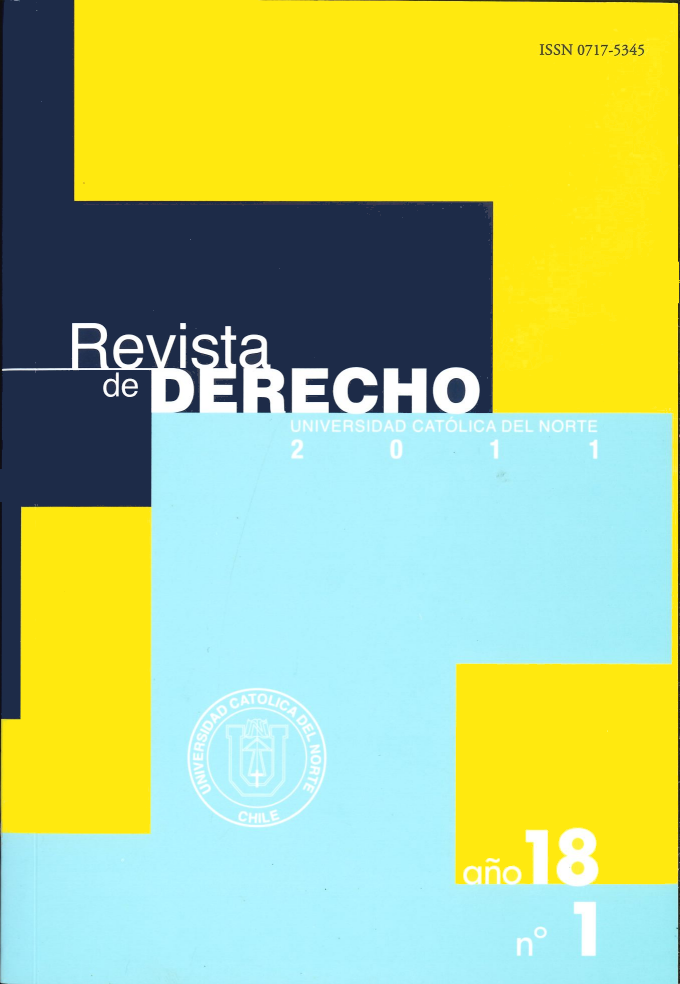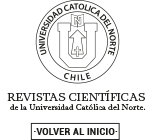La Persistence of Legal Proof in Family Judicatura
Keywords:
Family courts, sound criticism, legal proof, proof valoracion, credibilityAbstract
The reform to judicial procedure has posed fundamental changes to our proof system; we have gone from a system of legal proof to a system where the principles of liberty of proof and sound criticism prevail. These suppose that the exercise of proof valoration from our courts acquires different characteristics and requirements. Basically a specific and concrete analysis is demanded around the probatory proof that a certain judge gave to a determined means of proof and what reasons are behind it. This defers from what is expected from judges the Civil Procedure Code system, where the analysis id more mathematical and abstract. This document's focus is to show how, despite the fact that Family Courts consagrate the principle of liberty of proof and sound criticism, there is jurisprudence that demonstrates that judges still appreciate proofs according to the logic of the legal proof system, which is not compatible with said principles. I base my opinion in two issues: the use of general and abstract criteria to assess the witness' credibility and the tendency to require proof that is one hundred percent doubtless to determine the procedence of a divorce when the cause is the breach of basic marital duties.
References
BALDWIN, John (1961). "The Intellectual Preparation for the Canon of 1215 against Ordeals". Speculum, Vol. 36, No 4, 613-636 pp. [ Links ]
BENTHAM, Jeremías (2008). Tratado de las Pruebas Judiciales, segunda edición, Buenos Aires: Valleta Ediciones, 632 pp. [ Links ]
CAPPELLETTI, Mauro (2006). El proceso Civil en el Derecho comparado, Lima: ARA Editores, 182 pp. [ Links ]
CAROCCA PÉREZ, Alex (2003). Manual de Derecho Procesal. Tomo II, Santiago: Editorial LexisNexis, 367 pp. [ Links ]
CENTRO DE ESTUDIOS DE JUSTICIA DE LAS AMÉRICAS (2005). Reformas Procesales Penales en América Latina: Resultados del Proyecto de Seguimiento, CEJA, 229 pp. [ Links ]
CERDA SAN MARTIN, Rodrigo (2009). Valoración de la prueba. Sana crítica, Santiago: Librotecnia, 148 pp. [ Links ]
CLARO SOLAR, Luis (1939). Explicaciones de Derecho Civil Chileno y Comparado. De las Obligaciones. Tomo 12 Santiago, Imprenta Nascimento, pp. 822. [ Links ]
COUTURE, Eduardo (2003). Estudios de Derecho Procesal Civil, Tomo II Pruebas en materia civil, tercera edición, Buenos Aires: Depalma LexisNexis, 329 pp. [ Links ]
DAMASKA, Mirjan (1995). "Free Proof and Its Detractors". The American Journal of Comparative Law, Vol 43, No 3, pp. 343-357. [ Links ]
FERRER, Jordi (2007). La Valoración Racional de la Prueba, Barcelona: Marcial Pons 166. pp. [ Links ]
FOUCAULT, Michel (2005). La Verdad y las Formas Jurídicas, Barcelona: Editorial Gedisa, 2005, 184 pp. [ Links ]
FUENTES MAUREIRA, Claudio (2010). La Recepción de la Duda Razonable en el Sistema Procesal Penal Chile, Tesis para optar al grado de Magíster en Derecho, Santiago: 51 pp. [ Links ]
MAIER, Julio B.J.(1996). Derecho Procesal Penal, Tomo I. Fundamentos, segunda edición, Buenos Aires: Editores del Puerto S.R.L., 883 pp. [ Links ]
MARIN VERDUGO, Felipe (2010). "La Declaración de la parte como medio de prueba". Revista Ius et Praxis, Año 16, N° 1, pp. 125-170. [ Links ]
PAILLÁS, Enrique (2002). Estudios de Derecho Probatorio, segunda edición, Santiago: Editorial Jurídica de Chile, 182 pp. [ Links ]
PALOMO VÉLEZ, Diego (2010). Reforma Procesal Civil. Oralidad y poderes del juez, Santiago: Abeledo Perrot LegalPublishing, 394 pp. [ Links ]
PEÑAILILLO ARÉVALO, Daniel (1989). La Prueba en materia sustantiva civil. Parte general, Santiago: Editorial Jurídica de Chile 117 pp. [ Links ]
SILVA MONTES, Rodrigo (2005). Manual de Tribunales de Familia, Segunda edición, Santiago: Editorial Jurídica de Chile, 170 pp. [ Links ]
STEIN, Friedrich (1973). El Conocimiento Privado del Juez, traducción de Andrés de la Oliva Santos, Barcelona: Ediciones Universidad de Navarra, 238 pp. [ Links ]
TARUFFO, Michele (2002). La Prueba de los Hechos, traducción de Jordi Ferrer, España: Editorial Trotta, 542 pp. [ Links ]
TARUFFO, Michele (2006). Sobre las fronteras. Escritos sobre la Justicia Civil, traducción de Beatriz Quintero, Bogotá: Editorial Temis, 323 pp. [ Links ]
TARUFFO, Michele (2008). La Prueba, traducción de Laura Manríquez y Jordi Ferrer Beltrán, Barcelona: Marcial Pons, 324 pp. [ Links ]
TARUFFO, Michele (2010). Simplemente la Verdad, traducción de Daniela Accatino, Barcelona: Marcial Pons, 299 pp. [ Links ]
VIDMAR, Neil y HANS, Valerie (2007). American Juries. The Veredict, Nueva York: Prometheus Books, 428 pp. [ Links ]
Jurisprudencia
Corte Suprema de Chile. Sentencia de 2 de noviembre de 2009. Causa Rol 5.906-09.
Corte de Apelaciones de Concepción. 9 de junio de 2010. Causa Rol 423-2009.
Corte de Apelaciones de Santiago. Sentencia de 22 de mayo de 2009. Causa Rol 565-2009.
Segundo Juzgado de Familia de Santiago. Sentencia de 16 de agosto de 2010. Causa RIT C-2754-2007.
Segundo Juzgado de Familia de Santiago. Sentencia de 5 de mayo de 2010. Causa RIT C-1652-2008.
Juzgado de Familia de Rengo. 14 de abril de 2009. Causa RIT C-698-2008.
Juzgado de Letras, Garantía y Familia de Chanco. 7 de agosto de 2006. Causa RIT 22-2006.
Published
How to Cite
Issue
Section
Aquellos autores/as que tengan publicaciones con esta revista, aceptan los términos siguientes:
- Los autores/as conservarán sus derechos de autor y garantizarán a la revista el derecho de primera publicación de su obra, el cuál estará simultáneamente sujeto a la Licencia de reconocimiento de Creative Commons que permite a terceros compartir la obra siempre que se indique su autor y su primera publicación esta revista.
- Los autores/as podrán adoptar otros acuerdos de licencia no exclusiva de distribución de la versión de la obra publicada (p. ej.: depositarla en un archivo telemático institucional o publicarla en un volumen monográfico) siempre que se indique la publicación inicial en esta revista.
- Se permite y recomienda a los autores/as difundir su obra a través de Internet (p. ej.: en archivos telemáticos institucionales o en su página web) antes y durante el proceso de envío, lo cual puede producir intercambios interesantes y aumentar las citas de la obra publicada. (Véase El efecto del acceso abierto)





_(1).png)












